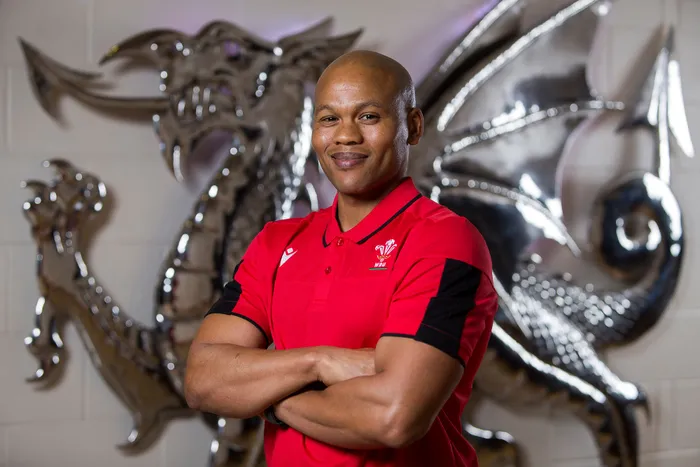
Former Wales Women's coach Warren Abrahams has died.
Image: WRU
“The good die young” is something we often hear these days. But nothing could have prepared me for the shock news of the passing of 42-year-old Cape Town-born rugby coach Warren Abrahams on Friday night.
Rugby has lost one of its most vibrant and dedicated coaches after Abrahams collapsed next to the field at the Safari Sevens tournament in Nairobi, Kenya, while in charge of the Belgium Women’s sevens team.
His death came as a huge shock to the rugby community. In response, the Belgian Rugby Federation withdrew their team from the tournament and announced immediate support for players and staff as they dealt with the loss.
Abrahams had joined the Belgium Women’s sevens team as head coach in recent years, bringing with him a wealth of experience gained through roles at Harlequins Academy, the Wales Women’s national team, and the sevens programmes of England and the United States.
Tributes have poured in from across the sport for a man known as much for his warmth and mentorship as for his tactical acumen.
Abrahams began his rugby journey as a fast, hot-stepping schoolboy talent, which earned him a bursary to study at the University of Stellenbosch, where he cut his teeth in the game. However, injuries curtailed his playing career and he later moved to the UK, where he took up coaching.
I spent some time with Warren during a trip to London in 2012, where he offered us some shelter to help combat the exchange rate. I had met him many years before through one of my best friends Jerome Solomons, who always mentioned his cousin's incredible rugby ability and brain.
Living in west London, opposite a KFC, my travel mate and I visited the fried chicken joint a few times that week — but Warren would always decline, as his steamed chicken breast and broccoli were always on his menu.
He took us around some of the sights of London, but we ended up enjoying the rugby chat more than getting a glimpse of Buckingham Palace or Big Ben.
His early rugby work included player development roles before joining the Harlequins Academy in England. During that period, he built a reputation as a nurturing, forward-looking coach, particularly in guiding young talent through the ranks.
In 2020, Abrahams was appointed head coach of the Wales Women’s national team — a historic appointment which made him one of the first Black national coaches in Welsh rugby. Though his tenure was impacted by the Covid-19 pandemic, he left an enduring impression on players and colleagues alike.
Later, he pursued opportunities in the sevens format. A talented sevens player himself, he might well have become a Blitzbok had it not been for injuries. He used to compete with Springboks such as Gio Aplon during his time at Maties.
He brought his energy and inclusive coaching style to the Belgium women’s sevens programme. His work there was characterised by a holistic vision — technical clarity, attention to mental resilience, and a focus on collective performance.
Those who knew Abrahams speak of a coach who never lost sight of the human side of sport. He was a mentor, confidant and guide — someone who believed that unlocking potential was the cornerstone of coaching. His leadership style emphasised communication, empathy and adaptability.
His social media platform, Rugby Creative, is testament to this, as he helped people from all backgrounds and skill levels get involved in the game he loved. His drills had become the stuff of legend, with many coaches copying his videos to help develop their players
Abrahams had a bright future in the game. The outpouring of grief and support underscores the depth of his impact.
Abrahams is survived by his wife, Hannah, and two young children — along with countless players whose lives he touched, and a global community of coaches and athletes who respected him. The rugby world has lost not just a coach, but a builder and a believer in the sport’s power to uplift and unite people.
Related Topics: